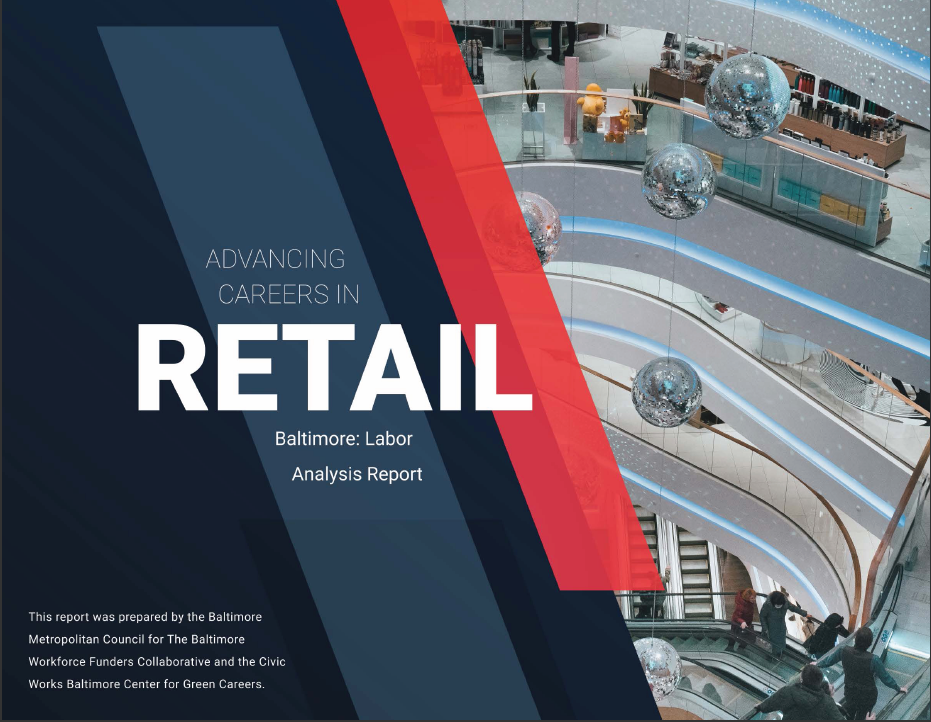Maryland Philanthropy Network invites you to join a variety of experts who will be sharing their insights into the issues providers supporting the developmental disability community are facing during the pandemic, what supports are available, and what gaps remain.
RESOURCE FOR MEMBERS ONLY
View materials from "Baltimore Workforce Funders Collaborative Wage Record Study Debrief".
FIND MORE BY:
Every day we show the world who we are through what we choose to wear. Color, cut and clothing choice are extremely personal forms of self-expression.
Join us as we engage in a consultative session with Councilman Cohen, Tisha Edwards, Bryonna Harris, Karen Webber, and Dr. Michael Sinclair to discuss how we make a systemic shift to prevent and address trauma city-wide and engage in collective healing at a personal and community level.
Please join the Maryland Philanthropy Network’s Health Funders for a conversation about alternative policing strategies for behavioral health. We will receive an overview of the behavioral health components of the Consent Decree, and discuss the potential alternatives needed in the system of care to promote diversion. We will hear from Crista Taylor, President and CEO of Behavioral Health System Baltimore, Terry Hickey, from the Mayor’s Office of Criminal Justice, and Lieutenant Colonel Monique Brown of the Baltimore City Police Department’s Neighborhood Patrol Division – the CPIC leaders.
Join Maryland Philanthropy Network, the Abell Foundation, and the Middendorf Foundation for a joint program examining recent research on Baltimore City’s contracting, payment, and permitting processes and how delays in those processes negatively affect non-profits and the high-need communities they serve. At this briefing, you will hear from authors of the newly released Abell Report on the City’s contracting process and learn about the findings from a joint Middendorf/MPN study on the City’s permitting and grantmaking systems. The goals of the briefing are to share the scale and scope of the challenges, recommend changes, and discuss how funders can support the implementation of these changes in an effort to strengthen and support Baltimore’s non-profit sector.
FIND MORE BY:
J.C. Faulk founded Bmore Community Food (BCF) from his car, during the early days of the COVID-19 Pandemic.
RESOURCE FOR MEMBERS ONLY
View materials from Green Funders Peer Learning Exchange.
FIND MORE BY:
The Baltimore Community Foundation’s $1.2 Million Donation Will Directly Support Victims’ Families and Survivors
On August 14, 2021, a 7.2 magnitude earthquake hit Haiti. Hundreds have been deeply affected and thousands are injured while others will be left homeless or jobless. It can be tricky to determine how to sift through the information to prioritize philanthropic action. Our colleagues at Hispanics in Philanthropy and the Center for Disaster Philanthropy have both compiled lists of trusted resources to help philanthropy bring attention and aid to affected communities. We encourage you to review these resources and share your generosity by making donations to affected residents of the island.
RESOURCE FOR MEMBERS ONLY
View Materials for "Baltimore's Promise Update – March 2019."
FIND MORE BY:
RESOURCE FOR MEMBERS ONLY
View program resources from A Conversation with Alice Kennedy, Commissioner of Baltimore City Department of Housing and Community Development.
FIND MORE BY:
RESOURCE FOR MEMBERS ONLY
View Materials from Healing Together with Healing City Baltimore
FIND MORE BY:
We've got good news, Baltimore.
 The Baltimore Workforce Funders Collaborative at Maryland Philanthropy Network has released a report designed to provide information on the labor market for the retail trade and food services/drinking places sectors in Baltimore City. This report was prepared by the Baltimore Metropolitan Council as part of Advancing Careers in Retail-Baltimore, a BWFC-sponsored partnership aimed at improving job quality and advancement opportunities...
The Baltimore Workforce Funders Collaborative at Maryland Philanthropy Network has released a report designed to provide information on the labor market for the retail trade and food services/drinking places sectors in Baltimore City. This report was prepared by the Baltimore Metropolitan Council as part of Advancing Careers in Retail-Baltimore, a BWFC-sponsored partnership aimed at improving job quality and advancement opportunities...
FIND MORE BY:
RESOURCE FOR MEMBERS ONLY
FIND MORE BY:
Baltimore has long faced a crisis of vacant and abandoned homes, which makes communities less safe and hurts families’ ability to build wealth through homeownership.
Realizing the purchasing power of anchor institutions to support local businesses and in turn create jobs is the focus of this new report, Authored by Karp Resources, the report explores food procurement processes in anchor institutions, and identifies a range of strategies to more fully realize local purchasing power. The report recommends actions to support local minority-owned and small businesses, modifications to procurement processes, and outlines legislative opportunities to connect purchasing power to businesses in reinvestment areas. Many of the recommendations are applicable not...

